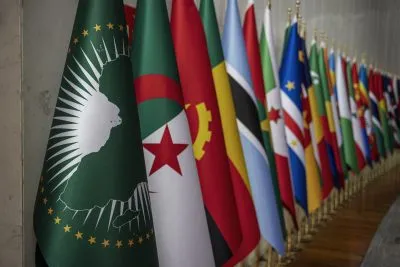For Adam Mugume, Executive Director at the Bank of Uganda, 2022 began optimistically, with the global economy beginning its recovery from the Covid lockdowns, and economic and social life within Uganda returning to normal as the vaccine rollout gathered pace; then out of the blue came the war in Ukraine, puncturing the rosy balloon.
Mugume and central bank leaders around the world were left to sort out the chaos inflicted on their financial calculations, as Russia’s assault on its neighbouring country intensified and the world split into opposing camps. The economic impact of the war has been to raise the prices of food and fuel so steeply that even the world’s strongest economies have been battling shortages and rising inflation.
“Everything had been very promising,” Mugume reflects. “We had fully opened the economy in January and schools and businesses that had been under lockdown before, had become fully operational.
“I think the Covid effect, assuming that there’s not another more deadly variant, is probably going to be managed, but the risk that has now come up is the Russian-Ukrainian conflict. Despite that, we still believe that economic growth will remain strong but obviously, this is to a point given there are risks on the horizon.”
In 2020, Uganda’s economy contracted by 1.5%, Mugume elaborates, but it bounced back in 2021 and grew in the range of 6.5-7%, despite some uncertainty due to the ripple effects of lockdowns in Europe at the end of the year. He sees Uganda’s economy as growing by around 6% in 2022.
Sectors like Uganda’s services industry, which were under heavy lockdown for much of 2021, have started “booming” now, Mugume says, adding that those sectors are likely to help propel sustained growth this year.
“However, the new risk is that we don’t know where this war is leading. Oil prices are already very high, so we don’t know to what extent the Russia-Ukraine situationwill cut growth, but we believe that it will still remain robust in 2022 – while hoping that there’s not another round of Covid infections or a subsequent lockdown. We feel that the danger from Covid is now waning, given that many people have been vaccinated,” he adds.
Uganda’s oil hopes
In February, the Bank of Uganda’s Deputy Governor Michael Atingi-Ego maintained the central bank rate at 6.5%. He said it was due to improvements in economic activities, and hinted that the bank might raise its private sector lending.
Mugume hopes that in 2023, the economy will be growing at around pre-Covid levels. He believes that the country’s fledgling domestic oil sector will help drive it.
In February, French oil giant Total and China National Offshore Oil Corporation approved a $10bn deal to turn Uganda into an oil producer and export its crude through the East African Pipeline. This is set to be the world’s longest heated oil pipeline when it is completed.
Uganda discovered crude reserves near its border with Democratic Republic of Congo in 2006 but exploiting them has been repeatedly delayed by disagreement between the government and oil firms on royalties and taxation.
The pipeline deal, which includes the development of two oil fields on the shores of Lake Albert, has drawn some criticism from climate activists but Mugume, like most Ugandans, believes the investment will stimulate economic growth.
“In 2023 and going forward, with more oil sector investments coming on board, added to some of the benefits from government public investment, we believe that growth will be about 7%, applicable to the short-to-medium term,” he explains.
Returning to the present situation, he points out that even before the Ukraine war, inflation had been edging up in Uganda due to pent-up demand, as domestic and international economies recovered from the pandemic.
Although the easing of the lockdown regulations had allowed the economy to find an even keel, the Russia/Ukraine conflict has arrived as a Black Swan and impacted the Ugandan economy in three major ways, including reducing trade.
“For example, we export tea, often to Mombasa and some of that tea was going to Russia. So the negative effect on trade comes from the loss of export markets. On the other side, Uganda imports a lot of wheat flour products, and the bulk are from Ukraine and Russia,” he says. The country has had to find alternative sources of wheat.
The Ugandan shilling also experienced exchange rate pressure as off-shore investors re-directed their funds to countries they see more as a safe haven, due to the economic turbulence caused by the conflict.
The war and severe economic sanctions have caused inflation to soar around the world and there are fears around global food security. Ukraine was called the “breadbasket of Europe” due to its high wheat and other agriculture-related exports – for example, sunflower oil, used in the manufacturing of edible oils and fertilisers.
This has led to shortages in many countries and higher food prices. Coupled to the higher energy prices as supplies of Russian oil and gas are constricted, many countries are experiencing a standard of living crisis. The ripple effect of this is affecting African countries like Uganda on several levels.
Tightening fiscal policy
Given this scenario, Mugume says that the country’s fiscal policy would need to be tightened to keep inflation in check.
“Now with the Russia/Ukraine conflict, inflation could rise much faster than even what we had at the beginning of February. We are looking towards a tighter monetary policy stance than probably what we had in February.” The bank will now focus on limiting an inflation spiral by controlling demand, he says.
Looking at the positive side, Mugume believes that the higher oil and gas prices sparked by the conflict could stimulate investments in Uganda’s domestic oil sector, ensuring it is on track to meet its target to start exporting oil by 2024 and “benefitting from the higher oil prices during that time”.
But he says that in the short-term, accelerating depreciation of the Ugandan shilling and inflation because of rising commodity prices will hamper growth.
Remembering Africa’s best governor
As well as macroeconomic turbulence, the central bank has also recently gone through some internal changes that have shaken up the order. The Bank of Uganda’s former Governor, Emmanuel Tumusiime-Mutebile, passed away in Nairobi on 23 January, aged 72. He had suffered from diabetes-related complications.
The late governor, regarded as the best Central Bank Governor in Africa for over two decades, helped pass key reforms to liberalise the country’s economy following a period of chaos and instability, during which power shifted from a number of rivals before being consolidated by the current President, Yoweri Museveni.
From the early 1990s, when he was working as Secretary to the Treasury, Mutebile helped liberalise the economy, leading to the selling off of struggling government-owned assets, driving economic growth and a reduction of poverty.
He continued his work after he became Governor of the Central Bank in 2001, and is credited with many of Uganda’s key economic reforms, including adopting a new monetary policy that focused on changing interest rates to help stave off inflation.
Mugume described Mutebile as an “instrumental figure who is missed” by the central bank. “One of the aspects we remember him for was his refusal to reverse policy. I think that’s one element he really had a mark on; it was very crucial in the case of a developing country like Uganda, because once you do a policy reversal, it distorts the foreign direct investment issues.”
“We pray that we get a replacement who has the same understanding, that policy reversal kills the economy and causes more distortion rather than really helping the economy to be more resilient.”
Although at the time of going to press, Mutebile’s successor had not yet been named, Mugume says that because of Mutebile, Museveni knows that the public sector works better when restricted, for example to infrastructure projects.
“Overall, I think he accepts the benefits of a liberal economy, where will you allow the private sector to flourish and you get the government to provide incentives through infrastructure development, etc.”
Want to continue reading? Subscribe today.
You've read all your free articles for this month! Subscribe now to enjoy full access to our content.
Digital Monthly
£8.00 / month
Receive full unlimited access to our articles, opinions, podcasts and more.
Digital Yearly
£70.00 / year
Our best value offer - save £26 and gain access to all of our digital content for an entire year!
 Sign in with Google
Sign in with Google 



